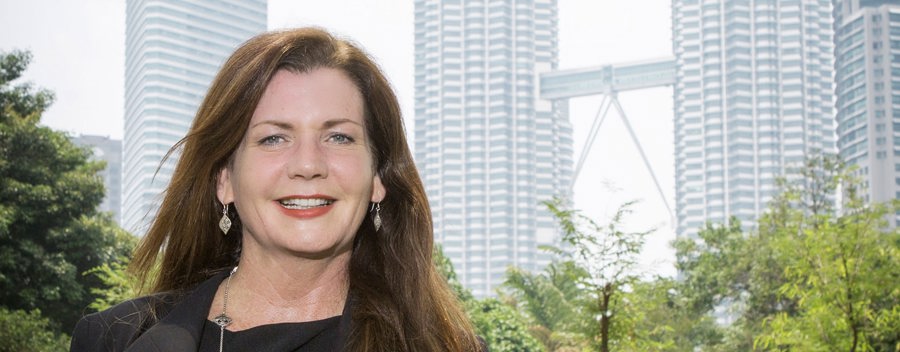
Meet Karyn Kenny ’95, resident legal advisor in Malaysia
Sometimes, life takes us in unexpected directions. Perhaps no one knows this better than Karyn Kenny ’95, who has traveled a long way from where she started, to do work she didn’t even know existed when she began her career.
Today, Kenny is the resident legal advisor for the U.S. Embassy in Kuala Lumpur, Malaysia, focusing on issues related to counterterrorism, anti–money laundering, and trafficking. Previously, she held the same role in Dhaka, Bangladesh. In both places, she serves as a diplomat with the U.S. Department of State, while remaining an employee of the U.S. Department of Justice (DOJ), where she plans to eventually return.
“The best part of my job,” she said, “is responding to another country’s needs, while also interweaving America’s interests. I know this might sound sappy, but the most rewarding part of my career is how proud and honored it makes me feel to be American.”
Kenny didn’t always want to be an attorney. In the early 1990s, she aspired to become an English professor. While a student in a master’s program in literature at New York University, she worked as a paralegal in the U.S. Attorney’s Office to pay the bills. But she proved to be so good at her day job that she was asked to be the paralegal assigned to the John Gotti organized crime racketeering and murder case. (The case ended in 1992 with the sentencing of Gotti to life imprisonment without parole by Judge I. Leo Glasser ’48.)
“Right from the start,” she said, “I loved the courtroom’s drama, its stories.”
Kenny soon changed course and enrolled as a part-time student at the Law School, determined to become a prosecutor. “I never felt like a different kind of student because I took classes at night,” she said. “I still had the chance to participate in Moot Court and take classes with renowned professors like Lisa Smith and the late Bob Pitler, who had a big impact on me.”
The most rewarding part of my career is how proud and honored it makes me feel to be American."After graduation, Kenny worked as an assistant district attorney in Manhattan for five years and then as a federal prosecutor in Las Vegas, where she started specializing in financial crimes such as bank robberies and money laundering. Kenny loved her work— and she met the love of her life while doing it. Her husband, Thomas, a U.S. Army reservist, was an assistant U.S. attorney in Las Vegas as well.
But she dreamed of living and working abroad. A Fulbright teaching scholarship took her to Lithuania, where she taught law students the U.S. criminal law system. After a fellowship with the U.S. Supreme Court, she joined the World Bank, where she worked with candidate E.U. accession countries. She met with local justice officials to create a framework of their justice sector that would demonstrate the required steps to meet certain benchmarks and satisfy the E.U. accession chapters.
“Sometimes, people outside the United States would ask me about how our jury system works,” Kenny said. “They were shocked by the idea of a jury, that we would trust anyone off the street with a verdict.”
After two years with the World Bank, Kenny joined the Asset Forfeiture and Money Laundering Section at the DOJ in Washington, D.C., where she focused on Mexico and Argentina. “Our job,” Kenny said, “was to make sure that the economies were kept clean of dirty money because that’s a cancer. The more dirty money you have, the weaker your economic system.”
When her husband volunteered for a six-month deployment in Afghanistan, Kenny took a DOJ position in Bangladesh, where she focused on money laundering and forfeiture issues. Kenny’s husband soon joined her in Bangladesh and they became the third married couple in DOJ history to co-run the justice section of an embassy. Their next stop was Kuala Lumpur, where Kenny now works in the resident legal advisor position.
“Every day here is different,” Kenny said. “The most challenging part of the work, of course, is the fact that we can’t change the world. I often wish I had a magic wand, so I could fix everything, but I don’t. So I try to focus on what I can do and how I can have an impact on a small part of the puzzle.”
—by Jen Swetzoff